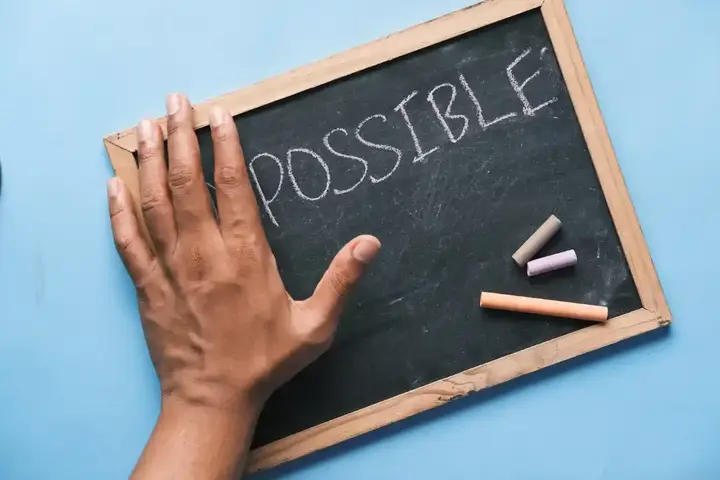How to develop your self-confidence?: The journey of character building and self-development
In a challenging and competitive world, self-confidence is a key factor for success and personal satisfaction. It's not just a sense of self-comfort, it's the force that pushes us to face difficulties and resolve to achieve our goals. Self-confidence stems from within the individual, and it reflects the extent of his belief in his abilities and skills.
Self-confidence is not born with man, but is built and developed through the experiences and situations he or she experiences. They are formed by interaction with the surrounding environment and relationships with others. Hence, the role of character building and self-development comes as pivotal elements in the development of self-confidence.
Recommend
In this article, we will explore the concept of self-confidence in depth, and learn about the ways in which self-development can build a strong and cohesive personality.
Definition of self-confidence

1.What is self-confidence? Self-confidence is faith in one's personal abilities and inner strength. They reflect how confident a person is in himself and in his ability to deal with various circumstances and challenges. People with high self-confidence tend to face life more positively and have the ability to achieve their goals effectively.
2. The relationship between self-confidence and mental health Self-confidence has a significant impact on mental health. They help reduce stress and anxiety levels, and promote feelings of satisfaction and happiness. People with high self-confidence tend to deal with stressors better and have greater resilience in the face of adversity.
Strategies for developing self-confidence

Developing self-confidence requires constant practice and the application of thoughtful strategies. Here are some strategies that can help boost self-confidence:
1. Setting realistic goals:
Setting achievable goals can help build self-confidence. Goals must be specific, measurable, and timeframed.
Celebrating small achievements fosters a sense of progress and encourages continued efforts.
2. Learning from experiences:
Every experience, whether successful or not, provides an opportunity to learn. Reflecting on lessons learned can boost self-confidence.
Accept failure as part of the learning process and use it as a motivation for improvement.
3. Effective communication:
Developing communication skills can help boost self-confidence. This includes active listening, clear expression of ideas, and positive interaction with others.
Participating in discussions and expressing one's opinion fosters a sense of competence and the ability to contribute effectively.
4. Physical and psychological health care:
Maintaining a healthy lifestyle boosts self-confidence. This includes proper nutrition, exercise, and getting enough sleep.
Mental health care through meditation, relaxation, and stress management techniques.
5. Positive thinking:
Adopting a habit of positive thinking can bring about a significant change in self-confidence. This includes focusing on successes rather than failures and looking for the positive aspects of each situation.
Using positive affirmations can help boost self-confidence and improve self-image.
Causes of poor self-confidence

Poor self-confidence may arise from a variety of causes and factors that affect an individual during the different stages of his life. Here are some common reasons that can lead to low self-confidence:
1. Negative experiences in childhood:
Harsh criticism, neglect, or neglect by parents or caregivers can negatively affect a child's self-confidence development.
Being bullied or verbally or physically abused can leave long-lasting effects on self-image.
2. Failure and frustration:
Frequent experiences of failure or frustration, especially if not treated positively, can reduce confidence in personal abilities.
Inability to achieve desired goals may lead to a feeling of helplessness and low self-confidence.
3.Negative comparisons:
Constant comparison with others, especially in the age of social media, can lead to feelings of inferiority and low self-confidence.
Feeling that others are better off, more successful, or more attractive can reduce self-esteem.
4. Social and cultural pressures:
Pressures to achieve certain standards of success or appearance can lead to poor self-confidence if an individual feels they cannot meet these expectations.
Cultural and gender stereotypes can reduce a sense of self-worth and reduce self-confidence.
5. Psychological and mental problems:
Disorders such as anxiety, depression, and eating disorders can negatively affect self-confidence.
Feeling isolated or lonely can reduce self-confidence and increase doubt about personal abilities.
It is important to recognize and address these causes through psychological support, developing positive strategies to deal with failure and frustration, and building a strong social support network. Working to improve self-confidence requires constant effort and commitment to personal growth and development.
Causes of poor self-confidence

Poor self-confidence may arise from a variety of causes and factors that affect an individual during the different stages of his life. Here are some common reasons that can lead to low self-confidence:
1. Negative experiences in childhood:
Harsh criticism, neglect, or neglect by parents or caregivers can negatively affect a child's self-confidence development.
Being bullied or verbally or physically abused can leave long-lasting effects on self-image.
2. Failure and frustration:
Frequent experiences of failure or frustration, especially if not treated positively, can reduce confidence in personal abilities.
Inability to achieve desired goals may lead to a feeling of helplessness and low self-confidence.
3.Negative comparisons:
Constant comparison with others, especially in the age of social media, can lead to feelings of inferiority and low self-confidence.
Feeling that others are better off, more successful, or more attractive can reduce self-esteem.
4. Social and cultural pressures:
Pressures to achieve certain standards of success or appearance can lead to poor self-confidence if an individual feels they cannot meet these expectations.
Cultural and gender stereotypes can reduce a sense of self-worth and reduce self-confidence.
5. Psychological and mental problems:
Disorders such as anxiety, depression, and eating disorders can negatively affect self-confidence.
Feeling isolated or lonely can reduce self-confidence and increase doubt about personal abilities.
It is important to recognize and address these causes through psychological support, developing positive strategies to deal with failure and frustration, and building a strong social support network. Working to improve self-confidence requires constant effort and commitment to personal growth and development.
Character Building: Sculpting Character in a Journey of Trust

At the heart of every achievement stands faith in the soul as a solid rock, and from this faith emerges the personality that shapes our identity and determines our path. Character building is not just a development of apparent qualities, but a carving of the values and principles on which self-confidence is based
Character building depends on a variety of factors that shape individual identity and influence behavior and values. These factors include life experiences, upbringing, education, social relations, and culture. Each experience teaches us a new lesson and contributes to the development of our personality. People who learn from their experiences and use them to grow tend to build a stronger, more cohesive personality.
At the end of this journey, we have explored the multiple dimensions of self-confidence and its importance in building a cohesive and strong personality. We have learned that self-confidence is not just a theoretical concept, but a practical force that enables us to achieve our goals and overcome challenges. Through self-development and personal development, we can open new doors for personal and professional growth and development.
We hope that the strategies and techniques presented in this article have provided you with the tools to start your own journey in building self-confidence. Always remember that self-confidence is an ongoing journey, not a final destination. For every step you take towards self-development, your strength increases and your horizons expand.
We wish you all the best in your journey towards self-confidence and personal excellence. Let every moment of your life be a step towards self-realization and success.
![]()
Surprising fact: The environmental impact of beef outweighs cars
Surprisingly, beef production harms the environment more than cars, mainly due to cows’ methane emissions and the massive resources needed to raise them. From deforestation to acid rain, the impact is huge. Cutting down beef consumption, even slightly, makes a big difference for the planet. more- ADVERTISEMENT
![]()
What is deepfakes? And is it possible to know it?
What is deepfakes? And is it possible to know it? more- ADVERTISEMENT
![]()
Belgrade, Serbia: Europe's new food capital?
Belgrade is now a buzzing foodie hotspot where creative chefs like Vanya Pushkar and Filip Seric reinvent traditional Serbian dishes with fresh flair. From smoked duck with herbs to grilled belly with currant sauce, the city's modern cuisine celebrates rich local flavors in vibrant, stylish settings. more- ADVERTISEMENT
![]()
For an unforgettable photo – your simplified guide to professional photography with minimal potential
You don’t need fancy gear for stunning photos—just train your eye, use natural light, and understand simple photography basics like composition and focus. With a bit of creativity and the phone in your pocket, you can capture amazing shots anywhere. more- ADVERTISEMENT
![]()
The Seven Years' War: A Global Conflict Defining a New Era
The Seven Years' War, fought from 1756 to 1763, was the first true global war, reshaping power across Europe, North America, and beyond. It marked Britain's rise as a colonial giant and set the stage for revolutions to come, with Frederick the Great and key battles leaving lasting impacts. more- ADVERTISEMENT
![]()
Time poverty: modern distress and how to escape from its grip
Despite all our modern tech advantages, many feel trapped in a cycle of busyness, constantly short on time. This sense of “time poverty” drains well-being and productivity. The key to breaking free? Align with what truly matters, simplify life, practice mindfulness, and build healthier ways to cope with stress. more- ADVERTISEMENT
![]()
The Star Marvel: Discovering the Extraordinary in the Milky Way
The star marvel of the Milky Way dazzles with its vivid colors, sparkling structures, and deep mysteries. It's a celestial masterpiece that has inspired scientists and artists alike, blending beauty, culture, and cosmic curiosity into one extraordinary galaxy. more- ADVERTISEMENT
![]()
The epic story of the Valley of the Kings in Luxor
Hidden under Egypt's desert sands, the Valley of the Kings holds grand tombs built to protect pharaohs like Tutankhamun and Seti I. Rich in secrets and treasure, it offers a journey into ancient history, where engineering genius met sacred beliefs in the afterlife. A mesmerizing destination for any explorer. more- ADVERTISEMENT
![]()
How food and pH affect the action of drugs in the body
How food and pH affect the action of drugs in the body more- ADVERTISEMENT
![]()
Golden hydrogen can change the course of the globe
Golden hydrogen, naturally formed deep underground, offers a clean, carbon-free energy source. It's abundant, renewable, and doesn't emit harmful gases, making it a game-changer for sustainable energy. Scientists are using AI to detect surface markers pointing to its presence, opening new frontiers in the search for eco-friendly fuel. more- ADVERTISEMENT





















